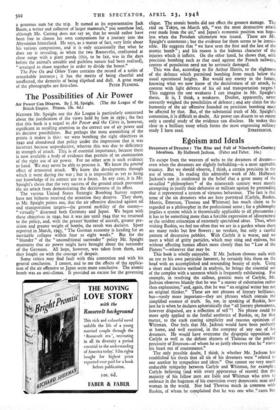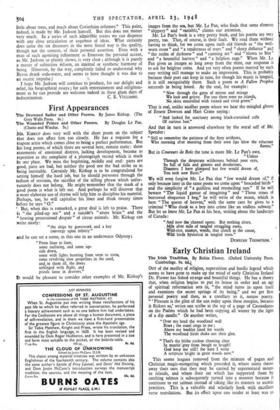Egoism and Ideals
To escape from the weavers of webs to the dreamers of dreams— even when the dreamers are slightly forbidding—is a most agoeable truancy. But we should observe, I think, a certain precision in the use of terms. In reading this admirable work of Mr. Holbrook Jackson's one is confirmed in the belief that a great many of the so-called " philosophers " of the nineteenth century were merely attempting to justify their defensive or militant egoism by pretending that it represented a system of virtuous behaviour. The fact is that none of the six dreamers who are here portrayed (Carlyle, Ruskin, Morris, Emerson, Thoreau and Whitman) has much claim to be regarded as a philosopher in the professional sense ; for a philosophy implies a system which is theoretically applicable to all phenomena ; it has to be something snore than a forcible expression of idiosyncrasy or the strident reiteration of extremely specialised ideas. Thus, when visiting Ruskin, we feel too often that we are in a garden where there
are many rocks but few flowers; verdure, but only a careful
pattern of decorative pebbles. ith Carlyle it is worse, and we meet a whirl of gritty particles, which may sting and enliven, but without affecting human affairs more closely than his " Law of the Planets "—whatever that may be.
This book is wholly enjoyable. If Mr. Jackson chooses nails with an eye to his own particular hammer, he certainly hits them on the head with an accomplished and resounding beauty of style. Using a short and incisive method in analysis, he brings the essential out of the complex with a sureness which is frequently exhilarating. For example, in resolving the callous, granitic mass of Carlyle, Mr. Jackson observes bluntly that he was " a master of exhortation rather than explanation," and, again, that he was " an original writer but not
an original thinker." These are not phrases of literary brilliance, but—vastly more important—they are phrases which contain the simplified essence of truth. So, too, in speaking of Ruskin, how just he is when he declares aphoristically that " all literary phenomena, however disguised, are a reflection of self "I No phrase could be more aptly applied to the fretful aesthetics of Ruskin, or, for that matter, to the stark roaring simplicity and raucous optimism of Whitman. One feels that Mr. Jackson would have been perfectly at home, and well received, in the company of any one of his dreamers. He would have overcome the dyspeptic opposition of Carlyle as well as the defiant shyness of Thoreau or the prickly preciosity of Emerson—of whom he so justly observes that he " stares his heart out of countenance."
The only possible doubt, I think, is whether Mr. Jackson has established his thesis that all six of his dreamers were " related to one another by sympathies and ideas." One cannot see very much endurable sympathy between Carlyle and Whitman, for example ; Carlyle believing (and with every appearance of reason) that the majority of his fellow men are foiils and Whitman who tries to embrace in the hugeness of his conviction every democratic man and woman in the world. Nor had Thoreau -much in common with Ruskin, of whom he complained that he was one who cares but
little about trees, and much about Corinthian columns." This point, indeed, is made by Mr. Jackson himself. But this does not matter very much. In a series of such admirable essays we can dispense with any close articulation or sequence of ideas. What certainly does unite the six dreamers in the most literal way is the quality, though not the content, of their personal assertion. Even with a man of such agonising refinement as Emerson the personal accent, as Mr. Jackson so plainly shows, is very clear ; although it is purely a matter of subjective feform, an internal or synthetic harmony of being. (Emerson, by the way, completely failed to understand why Byron drank soda-water, and seems to have thought it was due to an ascetic impulse.) I hope Mr. Jackson will continue to produce, for our delight and relief, his biographical essays ; for such entertainment and enlighten- ment as he can provide are welcome indeed in these glum days of



































 Previous page
Previous page